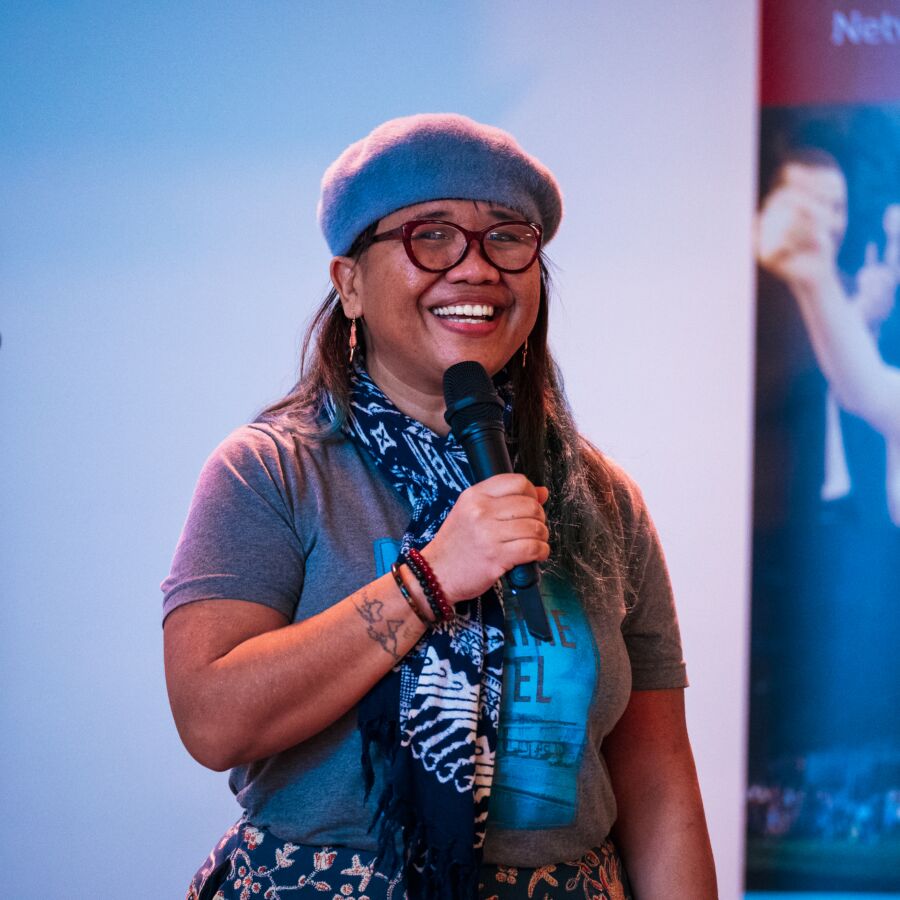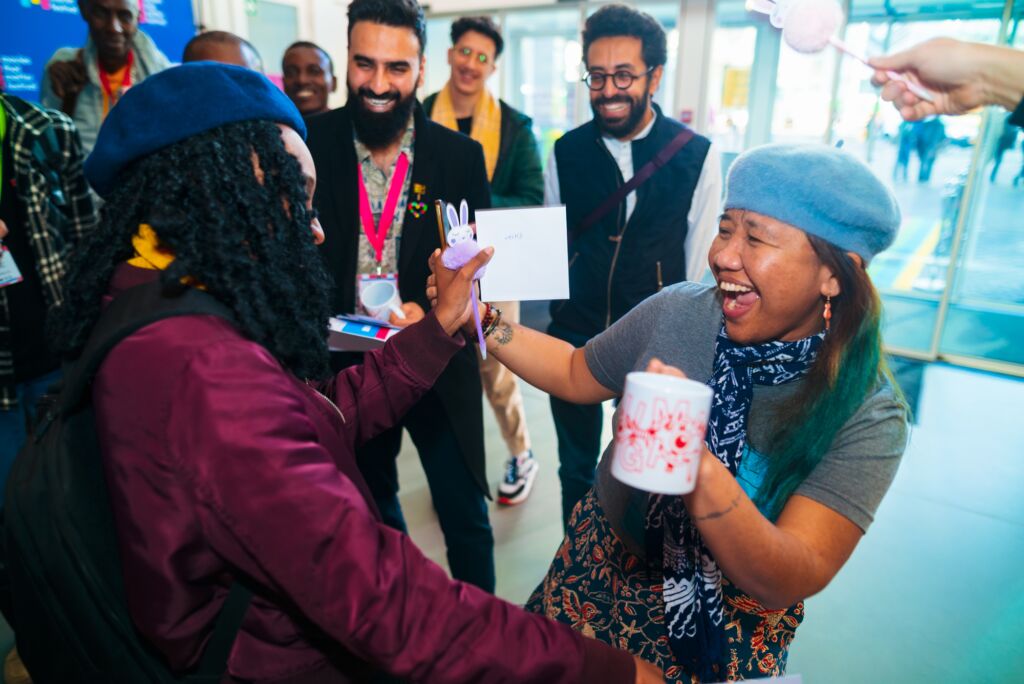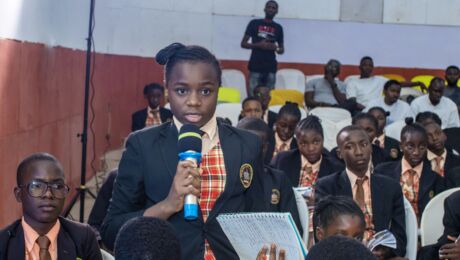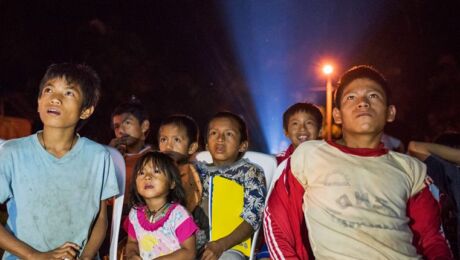Ripples of Change: Meninaputri Wismurti and the 100% Manusia Festival
At our festival this March we met up with Meninaputri Wismurti, who gave several workshops for international festival organizers during the Cinema without Borders programme. A veteran of the film industry, she is the co-founder and programme director of the yearly international 100% Manusia festival in Jakarta, Indonesia. She discusses some of her greatest challenges and victories in organizing her human rights festival with us. 27 August, 2024
Making Difficult Topics ‘Fun’
With her dyed hair and big smile, Meninaputri Wismurti looks as approachable as they come. She shares this cheerfulness with her colleague Farhan, present at the Movies that Matter Festival this year as a participant of Cinema without Borders. Together they seem like the perfect duo to tackle one of 100% Manusia’s greatest challenges: communicating heavy topics in a ‘fun’ way. “Unfortunately, films that are related to human rights issues always have these depressing tones,” Wismurti laments, “It is very rare to find a gem, a happy film.” Although this is a problem for human rights festivals around the world, in Indonesia it is especially difficult to attract people to such an event. ‘Human rights’ do not only have the connotation of not being fun, but also of being dangerous to discuss. “If I call my festival a ‘human rights film festival,’ no one will come in Indonesia because they are afraid of the word ‘human rights’.”
In light of this year’s polarising Indonesian national elections which saw controversial former army general Prabowo Subianto become the country’s president, Wismurti finds it essential to stress that the festival wants to bring people together rather than further alienate them from one another. Wismurti was confronted head-on by the polarisation within Indonesian society when a group of angry protesters rallied around the screening venues to protest the inclusion of LGBTQIA+ films at her previous project, Q! Film Festival. “At that time, we were living in a lot of danger. I could not go back to my own place at that time, so we had to hide.”
At that time, we were living in a lot of danger. I could not go back to my own place at that time, so we had to hide.
Besides leaving the ‘rights’ out of human rights (Manusia means ‘human’) in the festival’s marketing, the organization of 100% Manusia has done a lot to rid their festival of its stern and controversial nature. Although film screenings and accompanying Q&As are the main events, the festival has also hosted poetry slam readings, karaoke singing sessions, art exhibitions, book launches, and walking tours, all free of charge. On top of this, the festival has done its best to accommodate for visitors who are not able to watch a film by themselves because of physical constraints. These visitors are supported by ‘whisperers,’ specially trained volunteers who are tasked with explaining the scenes on the screen.
Different from Movies that Matter, the most difficult target group to reach for 100% Manusia is retired people. “[Senior citizens] feel a bit of shame of being old or aging, they don’t want to give people more trouble by climbing the stairs to get to their seats.” Wismurti even had trouble rallying her own wheelchaired mother for the last festival’s events. “And I say, no, it’s okay, they have a runway to go with the wheelchair and everything.” Her solution is to bring screenings to the retirement homes, community centers or municipality halls where senior citizens can often be found.
As high as your hands can reach
The festival’s second greatest challenge is shared by many branches of the cultural sector: financial constraints. 100% Manusia’s free-of-charge nature makes that all the work has to be done on a voluntary basis by people with various daytime jobs. “One is a psychologist, one is an accountant, one is a health practitioner. I am the only one who works in the film industry.”
In order to break even, the festival relies almost entirely on sponsors. These can be private donors, but also embassies: “If we already have a Mexican film in mind, we will go to the Mexican embassy.” Another source of funds has been the impact grants that 100% Manusia has received from Movies that Matter, designed to help human rights festivals around the world make lasting change in their respective contexts. For Wismurti’s festival, the funds are necessary to, among other things, reimburse the costs of food and transportation that the volunteers make.
What Wismurti found especially valuable in being part of the Cinema without Borders programme for international festival organisers is to realize that there are other enthusiasts who have willingly decided to embark on the poorly paying and politically challenging journey of organizing a human rights film festival. “For me it is important to come to this festival and to get an energy injection, an energy boost.” Nonetheless, she sometimes wonders whether her festival-organzing hobby is sustainable for herself in the long run. “I keep asking myself, do I really want to do this when I am 60, 70 years old? Is there anything that will change?” When she sees people linger in the venue for a Q&A after a film screening, however, she is reminded of the importance of this type of work. “Maybe you don’t see a big wave of change, but at least there are ripples.”

For the future, Meninaputri Wismurti hopes to expand the festival to other cities beyond Jakarta, and to organize more community-based events. Most importantly, however, she wants to keep the festival safe and ‘human.’ “Sometimes we also learn how to manage our expectations. My grandpa told me: dream as high as your hands can reach. So: know your limitations but go for it.”
The 2024 edition of 100% Manusia will take place between the 30th of August and the 8th of September in Jakarta, Indonesia.
Movies that Matter supports human rights festivals around the world. In this series, we highlight the stories of several people involved in our international programmes to discuss their projects and the impact they are making. The International Support team is committed globally by financially supporting human rights film festivals (Grant Programme), film screenings at embassies (Embassy Film Menu), an outreach programme for activists (Activist Programme), coordinating a partnership between festivals (Human Rights Film Network) and workshop programmes for film festival organisers (Cinema without Borders).


